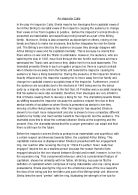Character Study: Sheila
Sheila's character develops drastically during the play. She starts off as a spoilt and irresponsible character, but later understands the consequences of her actions and is able to make mature decisions, like breaking off her engagement with Gerald.
In the beginning of the play, Sheila was presented as spoilt and superficial. When she's informed of Eva Smith's death, she says 'Oh, I wish you hadn't told me.' She obviously didn't want to know about such a horrible event and she implies that it's because she has been 'so happy tonight' that she didn't want to hear. She seems to regret finding out only because it has ruined her mood, not because she feels much sympathy for Eva Smith. This shows how spoilt she is because she seems to live in her own, protected bubble that doesn't allow her to understand the harsh parts of life, for example suicide. She seems to be more affected by her engagement dinner being interrupted than by this girl's suicide. She is also superficial because she asks the inspector if Eva was 'Pretty?' This also implies that she cares about appearances since she decided to ask the inspector about how Eva looked. This links back to how spoilt she is because she was raised to care about appearances. Priestley also builds her up to be a hypocrite because she blames her father for her death when she says 'perhaps that spoilt everything for her', when ironically, that's what the same thing Sheila does. Priestly tries to show how much Sheila doesn't pay any attention to the consequences of her actions (at this point in the play) because she criticizes her father for firing Eva when she is the reason Eva gets fired from her second job. Priestley also builds up Sheila to look like a hypocrite by having her say that 'these girls aren't cheap labour-they're people' because Sheila treats Eva as a disposable worker, just as her father did. The reader's opinion of her is very low because she is built up as a selfish spoilt girl, and then appears to be a hypocrite when her story is revealed, so the reader has no sympathy or respect for her because she didn't think to understand the consequences of her actions. This shows how Sheila's character started in the play and Priestley deliberately portrays her as a stereotype of a high class woman that is selfish so that the reader understands the change she goes through in the play when she evolves and is able to understand her actions.








